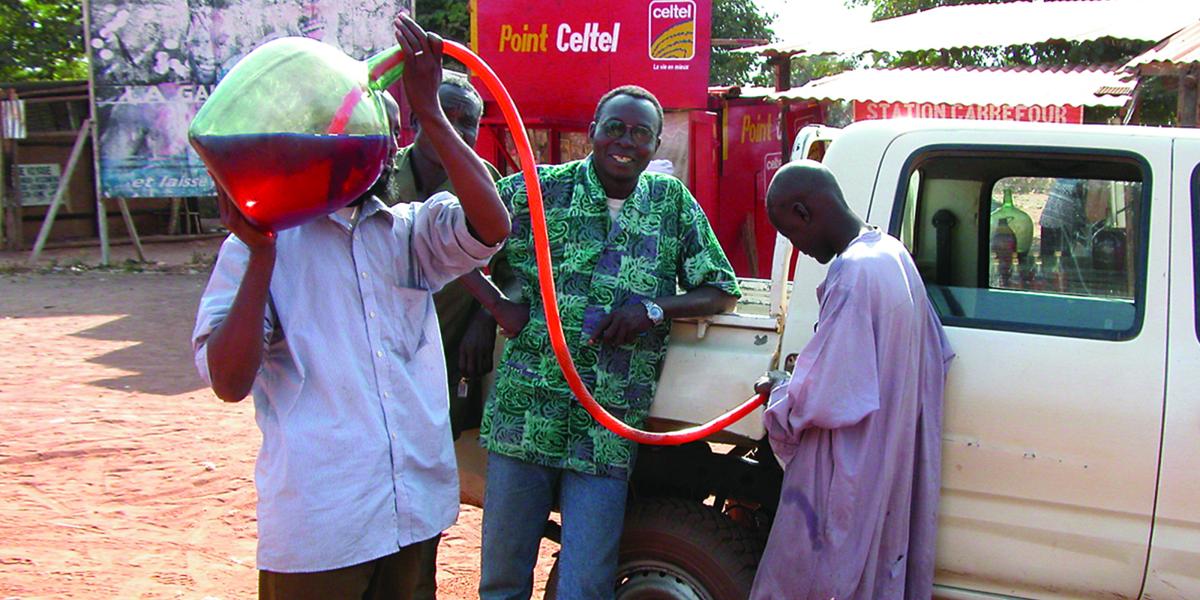Tapping Oil Revenues for Health?
Will a massive new oil pipeline project bring hope or harm to the impoverished country of Chad?
The oil is flowing in Chad, making its way through a 650-mile pipeline to a loading terminal off the Atlantic coast. A $4.1 billion oil facility began production in mid-2004 in a bid to spark economic growth in this Central African country where 80 percent of the population relies on agriculture to earn a meager livelihood.
How will the project impact the health of surrounding communities? That's the question that interests Lori Leonard, ScD, an assistant professor of Health, Behavior and Society. She has embarked on a long-term study to analyze the changes that unfold with Chad's new oil industry over the estimated 25-year lifespan of the oil pipeline. The project generated $399 million in revenues through the end of last year.
"We're looking at how modernization or development projects lead to very different ways of life," Leonard says. "What happens when farmers stop farming and begin to work on the pipeline project or in some other capacity? What happens to people's diets as they move from farming into the wage sector? We're defining health very broadly and looking really at social change and people's adaptation."
Leonard and a multidisciplinary research team began monitoring 120 households in 2001, when pipeline construction began. The households are distributed among three different settings: a rural village, a small town and a neighborhood on the edge of Chad's capital. Researchers so far have focused on rural residents, who have been affected to a greater degree because of their proximity to the oil fields.
The loss of farmland in the village has been the most visible change. Leonard said researchers are interested in how shifts in employment, agricultural production practices and food consumption relate to health. Prior to the oil project, for example, farmers allowed portions of their land to go fallow for periods so the soil could regain fertility. Now, the limited availability of agricultural land may lead to the use of fertilizers or pesticides to increase yields.
Among developing countries looking to oil as an economic development tool, Chad's situation is unique because of the World Bank's involvement as a financial backer, along with Exxon and two other private oil companies. The bank made its participation contingent on Chad's enactment of a law that requires the country to invest most of its oil revenues in health, education and basic infrastructure projects—an arrangement viewed as a potential model for other international financial institutions.
But earlier this year, the World Bank suspended its loans to Chad, placing the future of the oil operation in doubt. The move came amid reports that Chad mismanaged oil revenues and diverted some of the money to put down an armed rebellion in the country. Leonard said the nature of the World Bank's role in the project will not have a significant impact on her work. "We will continue to follow the households," she says.
Though donations from oil companies have gone toward rebuilding rural health clinics, it's unclear how gaps in staffing and training will be addressed, given the shortage of qualified health care workers. And despite promises of widespread improvements financed by oil riches, Leonard said that many Chadians have serious reservations about the future. "People have a tremendous amount of fear and skepticism about what's going to happen to them."
Nongovernmental organizations and groups monitoring the project have criticized its organizers for moving ahead too quickly on construction without fully considering the social and environmental impacts. "It's a difficult question," Leonard says. "What do you do when this is a country's primary resource, and it doesn't have many others to draw upon? On the other hand, this particular government has a history of problems with corruption and legitimacy, so it's a tough decision."
